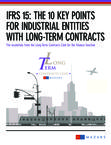
IFRS 15: The 10 key points for industrial entities with long-term contracts
IFRS 15: The 10 key points for industrial entities
The Club sessions gave everyone an opportunity, with the aid of case studies, to analyse the new standard, to compare it with existing practices in their sector and to benchmark their practices against those of other stakeholders.
IFRS 15 will be applicable to periods beginning on or after 1 January 2018, with a requirement to present comparative information from 2017 at least. Endorsement by the European Union is expected during the second quarter of 2016. Early application will then be possible.
2016 is thus an important year in terms of transition!
The following pages will outline the 10 key points identified during sessions of the Long Term Contracts Club:
1. Recognition of revenue over time is no longer automatic
2. A limited choice of methods for measuring revenue recognised over time
3. The end of margin smoothing
4. A potentially different breakdown of contracts, with a separate margin for each distinct good or service
5. A clear framework for estimating variable consideration
6. Upward or downward adjustment of revenue where there is a significant financing component
7. A legal approach to contracts and contract modifications
8. The end of due to / due from
9. Disclosure on the backlog, now defined in accounting terms
10. A restrictive approach to capitalising the costs of obtaining a contract


